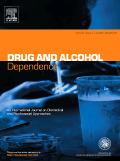
DRUG AND ALCOHOL DEPENDENCE
Scope & Guideline
Connecting research and practice in substance use disorders.
Introduction
Aims and Scopes
- Substance Use Disorders (SUDs):
The journal publishes research on the prevalence, etiology, and treatment of SUDs, including opioid use disorder, alcohol use disorder, and co-occurring substance use disorders. Studies often explore biological, psychological, and social factors that contribute to these conditions. - Pharmacological Interventions:
Research on pharmacological treatments for substance use disorders, including the efficacy and safety of medications like buprenorphine, methadone, and naloxone. This includes studies on novel medications and their mechanisms of action. - Behavioral and Psychosocial Interventions:
The journal highlights studies evaluating behavioral therapies, including cognitive-behavioral therapy, contingency management, and harm reduction strategies aimed at improving treatment outcomes for individuals with substance use disorders. - Epidemiology and Public Health:
Epidemiological research that examines trends, patterns, and risk factors associated with substance use and its consequences at the population level, including drug-related mortality and morbidity. - Social and Structural Determinants:
Investigations into how social, economic, and policy-related factors influence substance use behaviors, treatment access, and health outcomes, particularly among marginalized groups. - Innovative Research Methodologies:
The journal encourages the use of advanced research methodologies, including machine learning, epidemiological modeling, and qualitative approaches, to deepen the understanding of substance use and dependence.
Trending and Emerging
- Polysubstance Use:
There is a growing focus on the patterns and implications of polysubstance use, particularly in contexts such as the opioid epidemic, where individuals often use multiple substances simultaneously. - Impact of COVID-19 on Substance Use:
Research examining the effects of the COVID-19 pandemic on substance use patterns, treatment access, and mental health has surged, reflecting the urgent need to understand and address these challenges. - Digital Interventions and Telehealth:
The rise of digital health interventions, including telehealth for substance use disorder treatment, has become a prominent area of research, driven by the need for accessible care during and after the pandemic. - Health Equity and Social Justice:
Increased emphasis on understanding the social determinants of health and addressing disparities in substance use treatment and outcomes among marginalized populations, including racial and ethnic minorities. - Cannabis Research:
With the legalization of cannabis in many regions, research on its use, effects, and treatment for cannabis use disorder has gained momentum, exploring both medical and recreational contexts. - Neuroscience of Addiction:
Research exploring the neurobiological underpinnings of addiction, including brain imaging studies and the role of genetics in substance use disorders, is increasingly prominent.
Declining or Waning
- Traditional Alcohol Studies:
Research focusing solely on alcohol use, without consideration of co-occurring substance use or the complex interplay between different substances, has diminished as the field increasingly recognizes the importance of a more integrated approach. - Cigarette Smoking Research:
The volume of studies dedicated exclusively to cigarette smoking, particularly in isolation from other forms of tobacco use or nicotine products, has decreased as vaping and e-cigarette research has taken precedence. - Single-Substance Treatment Models:
There is a waning interest in research that evaluates treatment models for single substances, as the field moves towards understanding and addressing polysubstance use and the associated complexities. - Focus on Youth Substance Use:
While still an important area, the specific focus on youth substance use, especially in isolation from adult populations, has become less prevalent as broader studies encompassing all age groups gain traction. - Prevention Research:
The emphasis on traditional prevention strategies has seen a decline in favor of more innovative approaches that integrate technology and community engagement.
Similar Journals

Journal of Dual Diagnosis
Bridging the gap between mental health and substance use research.The Journal of Dual Diagnosis, published by Routledge Journals, Taylor & Francis Ltd, is a leading interdisciplinary platform dedicated to the critical study of co-occurring mental health and substance use disorders. With its ISSN 1550-4263 and E-ISSN 1550-4271, this esteemed journal has been at the forefront of advancing research and clinical practice since its inception in 2004, and continues to serve as a vital resource until 2024. Ranked in the second quartile (Q2) in Psychiatry and Mental Health and positioned at the 64th percentile in the Scopus rankings, it emphasizes the importance of integrating care across various domains of health. Although not open access, it offers a wealth of peer-reviewed articles, case studies, and reviews suitable for researchers, practitioners, and students alike, aiming to enhance our understanding and treatment of dual diagnosis. The journal's commitment to addressing the complexities of dual disorders not only informs research but also shapes policy and clinical guidelines, making it an essential read for anyone involved in these critical areas of mental health.
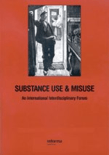
SUBSTANCE USE & MISUSE
Unraveling the intricacies of substance use to inform policy and practice.SUBSTANCE USE & MISUSE, published by Taylor & Francis Inc, is an esteemed academic journal dedicated to the multifaceted study of substance use and its implications on health and society. With a notable impact factor and categorized in the Q2 quartile across multiple fields—including Health (Social Science), Medicine (Miscellaneous), Psychiatry and Mental Health, as well as Public Health—this journal serves as an essential platform for researchers, professionals, and students alike. Spanning from 1966 to 2024, it provides a rich archive of peer-reviewed articles that explore current trends, innovative research, and evidence-based practices in the management and understanding of substance use. The journal offers various access options, catering to the diverse needs of its audience and affirming its commitment to fostering scholarly discourse in the United Kingdom and beyond. By engaging with this journal, readers can enhance their understanding of the complexities surrounding substance use, making it a crucial resource for advancing knowledge and informing policy in this critical area of public health.
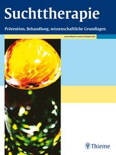
Suchttherapie
Empowering Minds Through Cutting-Edge ResearchSuchttherapie, an esteemed journal published by GEORG THIEME VERLAG KG, serves as a critical platform within the fields of Applied Psychology and Psychiatry and Mental Health. Established in 2000 and continuing through 2024, this journal is committed to advancing the understanding and treatment of addiction and related psychological issues. Although it currently stands in the Q4 Quartile ranking and is categorized as low percentile in both Scopus Ranks and impact metrics, its significance lies in its dedication to disseminating cutting-edge research and clinical findings that contribute to the evolving landscape of therapeutic practices. Published in Germany, the journal facilitates unlimited access to the vital discourse surrounding mental health and addiction treatment, making it a valuable resource for researchers, professionals, and students alike seeking to enhance their knowledge and skills in this important area of study. As the field continues to grow, Suchttherapie plays a pivotal role in bridging practice with academic rigor, ensuring that readers remain informed on the latest methodologies and insights.
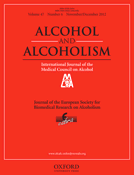
ALCOHOL AND ALCOHOLISM
Exploring the Complexities of AlcoholismALCOHOL AND ALCOHOLISM is a prominent peer-reviewed journal published by Oxford University Press that focuses on a range of topics within the fields of medicine, psychiatry, and toxicology. With an ISSN of 0735-0414 and an E-ISSN of 1464-3502, this journal has carved out a significant niche in the academic landscape since its inception in 1965 and is set to continue its critical role until 2024. Renowned for its rigorous research and scholarly contributions, it holds a respectable Q2 category ranking in 2023 across multiple domains, including Medicine (miscellaneous), Psychiatry and Mental Health, and Toxicology. The journal's Scopus rankings further reflect its impact, with commendable percentiles such as the 70th for Medicine (miscellaneous) and the 62nd for Psychiatry and Mental Health. While access is not open, the journal aims to advance knowledge and understanding of alcohol-related issues, making it an indispensable resource for researchers, health professionals, and students interested in the complexities of alcohol consumption and its effects on health and society.
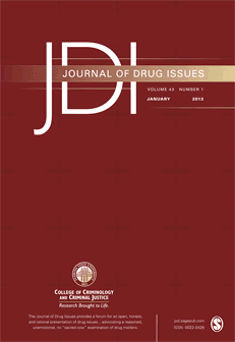
JOURNAL OF DRUG ISSUES
Championing Research for a Healthier TomorrowJOURNAL OF DRUG ISSUES, published by SAGE PUBLICATIONS INC, serves as a pivotal platform for researchers and professionals dedicated to the multifaceted exploration of drug-related topics across various fields, including health, medicine, psychiatry, and public health. With an ISSN of 0022-0426 and an E-ISSN of 1945-1369, this esteemed journal has maintained a consistent output since its inception in 1971 and is set to continue its contributions through 2024. Reflecting its high academic standards, it has achieved a Q2 ranking in Health (Social Science) and Q3 rankings in several related categories, underscoring its relevance and influence among scholarly work. The journal is indexed in Scopus, with respectable rankings in various medical and health-related disciplines, highlighting its role as an essential resource for those invested in the vigorous discourse surrounding drug issues. Although not an open-access publication, the journal ensures that access to its extensive research findings remains available to a broad audience, solidifying its importance in advancing knowledge and informing best practices in the field.
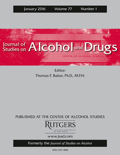
Journal of Studies on Alcohol and Drugs
Exploring the science behind addiction and recovery.The Journal of Studies on Alcohol and Drugs is a premier academic journal dedicated to advancing the understanding of alcohol and drug use, its effects, and its societal implications. Published by ALCOHOL RES DOCUMENTATION INC at the Center for Alcohol Studies, Rutgers University, this journal features comprehensive research that spans the disciplines of health, psychiatry, mental health, and toxicology. With its Q1 ranking in Health (Social Science) and Q2 ranking in Psychiatry and Mental Health, the journal plays a vital role in disseminating high-impact research that informs policy, prevention, and treatment strategies in addiction and substance use. The journal contributes significantly to the field, as evidenced by its solid Scopus rankings and engagement with contemporary issues, making it an essential resource for researchers, practitioners, and students. Although it does not offer open access, the journal's commitment to rigorous peer review and scholarship ensures that it remains at the forefront of research on alcohol and drugs through its converged publication timeline from 2007 to 2024.

Alcohol Research-Current Reviews
Promoting open access to critical alcohol studies.Alcohol Research-Current Reviews is a pivotal journal dedicated to advancing the understanding of alcohol-related issues and promoting scientific discourse in the fields of addiction and public health. Published by the National Institute on Alcohol Abuse and Alcoholism, this journal serves as a comprehensive platform that consolidates contemporary reviews on a wide array of topics related to alcohol, including its biological effects, societal implications, and prevention strategies. Despite its coverage in Scopus being discontinued, the journal remains a respected resource among researchers and practitioners, supporting the dissemination of important findings and fostering ongoing education in alcohol research. The open access option ensures that valuable research is readily available to an expansive audience, further enhancing the journal's impact in the academic community. With a ISSN of 1535-7414 and E-ISSN 1930-0573, the journal is committed to providing high-quality, peer-reviewed content that informs and influences public policy and health interventions.
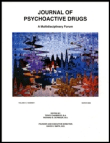
JOURNAL OF PSYCHOACTIVE DRUGS
Illuminating the Intersection of Substance Use and SocietyJOURNAL OF PSYCHOACTIVE DRUGS, published by Routledge Journals, Taylor & Francis Ltd, stands as a leading resource in the fields of psychology and medicine, focusing on the intersection of psychoactive substances and their impact on human behavior. With an ISSN of 0279-1072 and E-ISSN 2159-9777, this esteemed journal has been a pivotal platform for rigorous research since its inception in 1967, contributing to the understanding of drug use, its societal implications, and therapeutic potentials. It currently holds a Q2 ranking in both the miscellaneous categories of Medicine and Psychology for 2023, reflecting its significant standing within academic circles. Moreover, its Scopus rankings place it at the 49th percentile in General Psychology and 101st in Medicine, underscoring its relevance in contemporary research. Although it is not available via Open Access, the journal maintains a commitment to advancing knowledge through its annual publications until 2024. JOURNAL OF PSYCHOACTIVE DRUGS is essential for researchers, professionals, and students seeking to explore the complexities of psychoactive substances and their effects in various contexts.

Substance Abuse
Empowering professionals with cutting-edge insights.Substance Abuse is a premier scholarly journal published by SAGE Publications Inc, dedicated to advancing the understanding and treatment of substance use disorders. With an established presence from 1995 to 2023, the journal boasts an impressive Q1 ranking in both Medicine (miscellaneous) and Psychiatry and Mental Health, positioning it among the top tier of academic publications in these fields. Researchers and professionals will find its articles, which are grounded in rigorous empirical studies and innovative interventions, essential for addressing the complex and multifaceted nature of substance abuse. Although not an open access publication, Substance Abuse maintains a commitment to sharing valuable insights and findings, making it a vital resource for those looking to enhance their knowledge and practice. Located in Thousand Oaks, CA, this journal serves as a critical forum for international dialogue and research dissemination, ensuring that current trends and challenges in substance use are thoughtfully examined and discussed within the academic community.
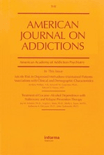
AMERICAN JOURNAL ON ADDICTIONS
Innovating Solutions for Addiction ChallengesThe AMERICAN JOURNAL ON ADDICTIONS, published by WILEY, stands as a premier publication within the realms of Clinical Psychology, Medicine, and Psychiatry. With its ISSN 1055-0496 and E-ISSN 1521-0391, the journal has been a critical resource since its inception in 1992, consistently evolving to encompass a wide scope of addiction research and its implications on public health. Renowned for its rigorous peer-reviewed articles, it boasts impressive rankings, including Q1 status in both Clinical Psychology and Medicine (miscellaneous) for 2023, and a respectable Q2 in Psychiatry and Mental Health. As a foundational platform for disseminating cutting-edge research, the journal aims to facilitate the exchange of knowledge among researchers, healthcare professionals, and educators alike. Its significant impact on the academic community is underscored by its Scopus rankings—placing it in the top 26% of Clinical Psychology journals and the top 28% in Medicine (miscellaneous). By fostering an understanding of addiction and its treatments, the AMERICAN JOURNAL ON ADDICTIONS plays an essential role in guiding innovative practices and shaping future policies within the field.